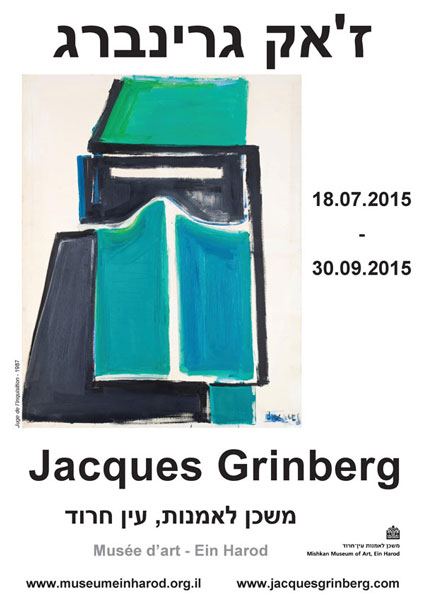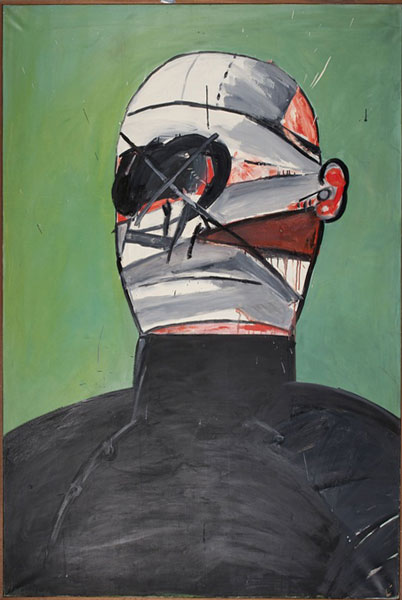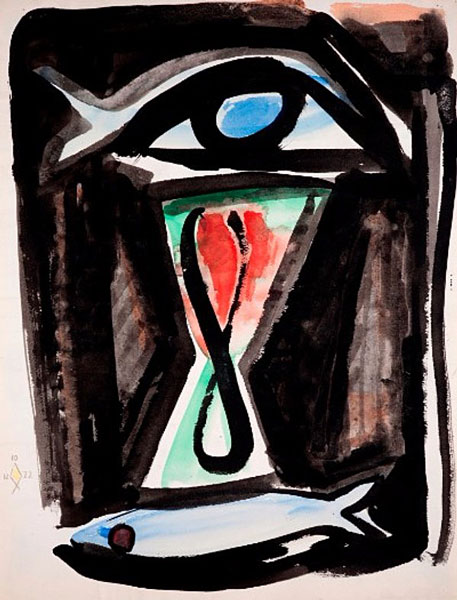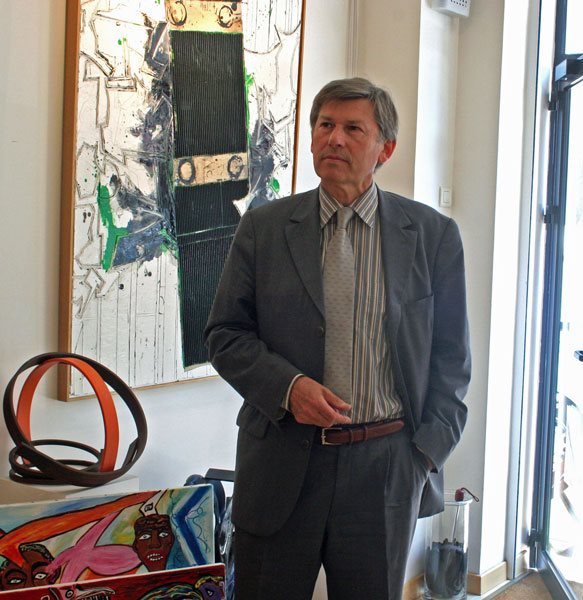Jean-Pierre Schosteck, Maire de Châtillon
Thierry Braconnier, Adjoint au Maire délégué à la Culture et à la Vie associative
Caroline Quaghebeur, Directrice de la Maison des Arts
sont heureux de vous inviter à visiter l'exposition:
Jacques Grinberg
Entre chair et esprit
du 15 janvier au 28 février 2016
Maison des Arts
11 rue de Bagneux - 92320 Châtillon
Tél. 01 40 84 97 11
http://maisondesarts-chatillon.fr/Exposition ouverte tous les jours sauf le lundi, de 14h à 18h jusqu'au 28 février 2016.
Né en 1941 à Sofia (Bulgarie), Jacques Grinberg et sa famille s’installent en Israël en 1954. Scolarisé dans un kibboutz, il part, à 17 ans, étudier aux Beaux-Arts de Tel-Aviv. En 1961, il s’installe à Paris pour se confronter à la capitale des arts.
Il fait alors partie des précurseurs de la Nouvelle Figuration mais s’en détache rapidement. Jacques Grinberg suit alors sa propre voie avec, en fil rouge, la volonté de dénoncer les oppressions : « Je veux peindre pour les autres ».
Jacques Grinberg Huit (ou Autel) 1974
encre de chine, 50 x 65 cm
Pour cette exposition, la Maison des Arts a sélectionné un ensemble d’oeuvres retraçant le parcours de l’artiste de 1960 à 2000 témoignant de ses principales sources d’inspiration (politiques, philosophiques, culturelles, spirituelles) et de la vigueur de leurs expressions.
Peintre engagé, résistant, il dénonce à travers sa peinture les fascismes en invoquant l’Homme, sa chair, son visage mais aussi les symboles religieux ou ésotériques du monde. Confronté personnellement à une tension permanente due à l’incapacité de cohésion dont font preuve les pays, aux agissements bestiaux des Hommes entre eux et à des images d’horreurs, Jacques Grinberg s’oppose à toute notion d’appartenance si ce n’est celle qui prône une liberté de pensée.
Le parcours de l’exposition «Entre chair et esprit» passe par le corps mutilé, la violence dans la peinture pour arriver à un apaisement relaté à travers des allégories et des symboles.En collaboration avec l'association "L'Homme bleu"
| Rétrospective Jacques Grinberg au Musée de Ein Harod |
 |
|
Du 18 Juillet au 30 Septembre 2015, au musée d'Art de Ein Harod en Israël Commissaires : Galia Bar Or, directrice du musée, et Nimrod Reitman. Cet évènement est organisé en partenariat avec l'association l'Homme bleu, et avec le soutien de la Fondation Jacqueline de Romilly. Il donne lieu à la publication d'un catalogue bilingue Hébreux Anglais. Le Musée d'art de Ein Harod - premier musée construit dans ce pays - donne à l'œuvre de Jacques Grinberg la visibilité qu'elle mérite tout en la reliant avec l'histoire de l'art israélien. |
 |
|
Jacques (Yaakov) Grinberg | Paintings Curators: Galia Bar Or, Noam Segal Jacques Grinberg was born in 1941, in Bulgaria, and lived in Sofia during the war years. His father, Natan Grinberg, a member of the Communist Party in his youth, held a high position in the leadership of Communist Bulgaria after the war. In 1954, the family moved to Israel and settled in Bat Yam. On his arrival, Jacques went to school in a kibbutz, and at a young age began studying art at the Avni School in Tel Aviv. He probably was not exposed directly to the horrors of the Holocaust, but the subject was not repressed, certainly not by his father, who already in 1945 had published a book of documents attesting to the attempts of the Bulgarian fascist government to eliminate Bulgarian Jewry and to the involvement of the army and the police in the expulsion and extermination of the Jews of Thrace and Macedonia. After the book disappeared from the bookshops in Bulgaria, he published it again in Israel (in Bulgarian). In 1961, Natan Grinberg published another book in Israel, with a painting by his son on its cover. Jacques’s communistic world view and his acute sensitivity to the events of the time and to man’s fate were an inseparable part of the habitus he grew up in, and are embedded in his work. After showing his works in several exhibitions in Tel Aviv galleries, Jacques moved to Paris in 1962, and in a short time found his place among the first artists who promoted the “New Figuration” orientation, which proposed a contemporary painting that struck out against the abstract, which had taken over everywhere. Grinberg’s paintings – large in format, bold in their colors – focused on human and animal images, and were highly successful. He was represented by a leading gallery and his paintings were shown in well-regarded exhibitions. But the failure of the Students’ Revolt in 1968 and the collapse of the gallery that represented him (and sold his paintings at a loss, which broke the market for his works) created a new reality for him, and he found it difficult to recover. Jacques Grinberg died in Paris in 2011. A bilingual catalogue accompanies the exhibition at the Mishkan Museum of Art, in collaboration with The Homme bleu Foundation. In addition to texts by the curators, the catalogue contains an article by the poet Meir Wieseltier. Further exhibitions Of Grinberg's paintings are planned in 2016-2017 in France (Museum of Modern Art City of Paris, collector's donations) and Bulgaria.
|




